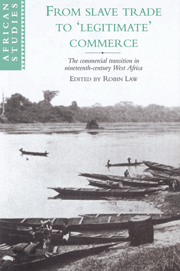 From Slave Trade to 'Legitimate' Commerce
From Slave Trade to 'Legitimate' Commerce Book contents
- Frontmatter
- Contents
- List of contributors
- List of abbreviations
- Introduction
- 1 The initial ‘crisis of adaptation’: the impact of British abolition on the Atlantic slave trade in West Africa, 1808–1820
- 2 The West African palm oil trade in the nineteenth century and the ‘crisis of adaptation’
- 3 The compatibility of the slave and palm oil trades in Dahomey, 1818–1858
- 4 Between abolition and Jihad: the Asante response to the ending of the Atlantic slave trade, 1807–1896
- 5 Plantations and labour in the south-east Gold Coast from the late eighteenth to the mid nineteenth century
- 6 Owners, slaves and the struggle for labour in the commercial transition at Lagos
- 7 Slaves, Igbo women and palm oil in the nineteenth century
- 8 ‘Legitimate’ trade and gender relations in Yorubaland and Dahomey
- 9 In search of a desert-edge perspective: the Sahara-Sahel and the Atlantic trade, c. 1815–1900
- 10 The ‘New International Economic Order’ in the nineteenth century: Britain's first Development Plan for Africa
- Appendix The ‘crisis of adaptation’: a bibliography
- Index
1 - The initial ‘crisis of adaptation’: the impact of British abolition on the Atlantic slave trade in West Africa, 1808–1820
Published online by Cambridge University Press: 21 September 2009
- Frontmatter
- Contents
- List of contributors
- List of abbreviations
- Introduction
- 1 The initial ‘crisis of adaptation’: the impact of British abolition on the Atlantic slave trade in West Africa, 1808–1820
- 2 The West African palm oil trade in the nineteenth century and the ‘crisis of adaptation’
- 3 The compatibility of the slave and palm oil trades in Dahomey, 1818–1858
- 4 Between abolition and Jihad: the Asante response to the ending of the Atlantic slave trade, 1807–1896
- 5 Plantations and labour in the south-east Gold Coast from the late eighteenth to the mid nineteenth century
- 6 Owners, slaves and the struggle for labour in the commercial transition at Lagos
- 7 Slaves, Igbo women and palm oil in the nineteenth century
- 8 ‘Legitimate’ trade and gender relations in Yorubaland and Dahomey
- 9 In search of a desert-edge perspective: the Sahara-Sahel and the Atlantic trade, c. 1815–1900
- 10 The ‘New International Economic Order’ in the nineteenth century: Britain's first Development Plan for Africa
- Appendix The ‘crisis of adaptation’: a bibliography
- Index
Summary
Since 1956, when Dike argued that abolition involved ‘a drastic change’ for Africa, with Britain's withdrawal from slaving in 1807 precipitating ‘an economic crisis among African traders’, the impact of British abolition on Africa has been the subject of controversy. What impact, if any, did British abolition have on the economies of West Africa? Most historians now agree that the transition from the export trade in slaves to the export of primary products such as palm oil, peanuts and gum arabic, was a major transformation in West Africa, which Hopkins equates with the emergence of the modern economy of West Africa. There is, however, considerable disagreement over the timing and nature of economic change that was associated with this transition. Much of the recent scholarly literature has tended to agree with Dike that there were significant adjustments after 1807, but there is considerable doubt about the extent and timing of these adjustments. Whether or not they constitute a ‘crisis’ is another matter.
Much of this debate depends upon an analysis of the volume and value of the slave trade in the first half of the nineteenth century. It is now generally recognized that there was a sharp drop in the number of enslaved Africans leaving West Africa in the decade or two after 1807 and that the price for slaves at the Atlantic coast of Africa experienced a sudden drop in nominal and real terms during the same period.
- Type
- Chapter
- Information
- From Slave Trade to 'Legitimate' CommerceThe Commercial Transition in Nineteenth-Century West Africa, pp. 32 - 56Publisher: Cambridge University PressPrint publication year: 1995
- 29
- Cited by


